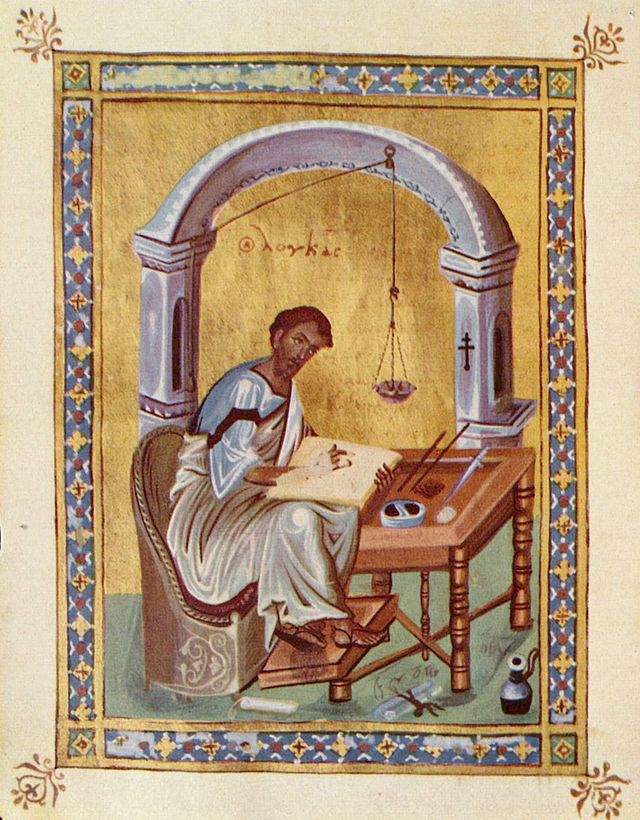
Marcion of Sinope (source: wikipedia)
Marcion of Sinope (c. 85—160) is the Arch-Heretic according to the universal consensus of the [early] Church. Marcion (pronounced "Martian") is an alien to the Christian Church, but not because he is a green extraterrestrial from Mars. Marcion is the greatest heretic of all time, even greater than Arius, Sabellius, and all the famous heretics condemned by the Universal Church. (A Papist once told me that the only heretic to surpass Marcion is the Arch-Heretic, Martin Luther!)
What was Marcion's crime? He emphasized Jesus too much!
Marcion became The Arch-Heretic, not only because of redaction of the scriptures, but the great success he had in establishing Marcionism throughout the entire Roman Empire. As Peter Enns recently remarked, it is remarkable that Marcion's works are all lost. Greg Boyd reminded me that Marcion's works could be reconstructed due to the vast volume of works written against Marcion. The Ante-Nicene literature contains many substantial works against Marcion, including famous Patristic works by Justin (Apol. I. 26, 58), Irenaeus (Ag. Her. I. 27), and Tertullian (adv. Marc. I-V), and many others
The Church Historian, Adolf v. Harnack wrote a famous commendation of Marcion: Marcion: The Gospel of an Alien God (German Edition is free online), in which Harnack praised Marcion's Pan-Christism. The Moltmanniac shared this quote from Karl Barth in which Barth repeated Harnack's commendation of Marcion:
"There are few Christian theologians who refer faith so strictly to God's revealing work in Christ, who so earnestly try to connect it with Christ alone, as this heretic did." —Karl Barth
To explore this positive reappraisal of Marcion, I've assembled the following longer quotations from A. v. Harnack's History of Dogma Vol. I and Karl Barth's The Church Dogmatics Vol. III/1: Doctrine of Creation on Marcion. The first is a biographical sketch of Marcion by Adolf Von Harnack, and then is a similar epitome by Karl Barth on Marcion's theology, and lastly is Karl Barth's praise of Marcion's Pan-Christism coupled with criticism.
To summarize, this Arch-Heretic suffered a tragic life and if he had only seen the true Jesus in his Pan-Christism instead of a Gnostic Jesus, and had seen the true New Covenant in his emphasis on the covenant, we may have remembered Marcion as a Church Father. (For further reading, see the Moltmanniac's recent post on Jürgen Moltmann's commendation of Marcion.)
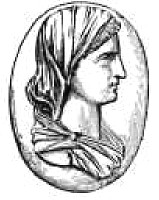
Marcion of Sinope
(source: wikipedia)
Adolf Von Harnack: Marcion's Biography
Harnack's entry on Marcion in his History of Dogma Vol. I. is available online and introduces Marcion as follows:
He belonged to Pontus and was a rich shipowner: about c. 139 he came to Rome already a Christian, and for a short time belonged to the church there. As he could not succeed in his attempt to reform it, he broke away from it about c. 144. He founded a church of his own and developed a very great activity. He spread his views by numerous journeys, and communities bearing his name very soon arose in every province of the Empire. They were ecclesiastically organised and possessed bishops, presbyters, etc. Justin about 150 tells us that Marcion’s preaching had spread ?at? p?? ????? ?????p??, and by the year 155, the Marcionites were already numerous in Rome.
Up to his death, however, Marcion did not give up the purpose of winning the whole of Christendom, and therefore again and again sought connection with it, likewise his disciples. It is very probable that Marcion had fixed the ground features of his doctrine, and had laboured for its propagation, even before he came to Rome. In Rome the Syrian Gnostic Cerdo had a great influence on him, so that we can even yet perceive, and clearly distinguish the Gnostic element in the form of the Marcionite doctrine transmitted to us.
Harnack, Adolf Von "History of Dogma Vol. 1" Ed. P. Smith. Trans. N. Buchanan. London: Constable and Company, 1976. 267. Print.
In a surprising, but not so surprising after all, section of The Church Dogmatics Vol. III/1, Marcion finds a friend in our Church Father, Karl Barth! In the following quotation, Barth introduces Marcion in a much more positive light, although Barth does not acquit Marcion as Harnack had done.
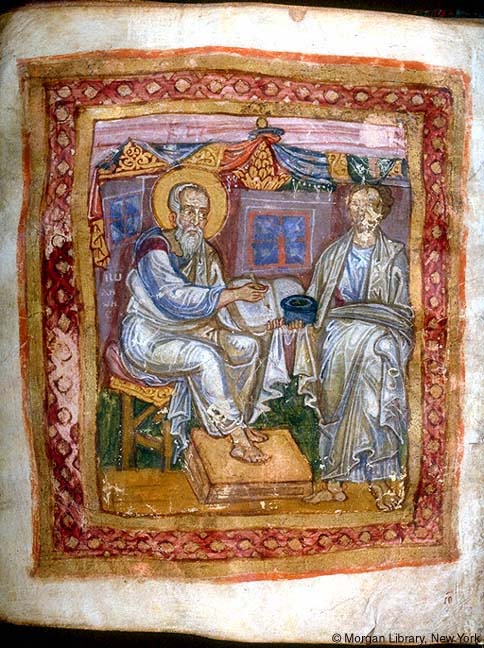
Apostle John (left) and Marcion Sinope (right), 11th Century (source: wikipedia)
Karl Barth: An Introduction to Marcion
The thesis of Marcion (cf. for what follows A. v. Harnack, Marcion: Das Evangelium vom fremden Gott, 2nd edn, 1924) stands in diametrical opposition to the principle that creation is beneficent. As he sees it, creation and benefit are mutually exclusive ideas. Only the antithesis is tenable that creation is not beneficent but maleficent. Creation as such is the origin of sheer darkness and horror, of falsehood, shame and evil. And its product, the creature, can only look forward to the dissolution corresponding to and merited by this depravity. The good activity of God not only begins when creation ceases, but is the negation and opposition of the latter. The message which announces this, the Gospel of Jesus Christ, confronts as a new and alien truth man and his world as they exist on the basis of creation and are determined by it. The salvation it promises consists in man's release from the wholly disastrous work of creation.
In these circumstances there can be no question of an identity between the author of creation and the true God revealed and active in Jesus Christ; the God of salvation. Creation is the work of an inferior God only too well known to man as profane and evil; a God who even used bad material. The mark of this God is the "justice" of an envious tyrant concerned only about His own honour, rewarding submission to His will and avenging rebellion, and in all His undertakings—primarily in the creation and determination of man, but also in the organisation and equipment of the cosmos, and the direction of history—revealing himself as a crude, ignorant and petty bungler, supremely suspicious and unkind, and in the last resort care-ridden and impotent.
This bad Creator-God with His justice is the God of the equally bad Jewish people which He chose with blind particularity; the God of the Old Testament. His bad spokesmen and servants are the Old Testament patriarchs and prophets. His bad revelations in the Law, with its external, fleshly, capricious and cruel demands. His bad Chris is the Old Testament Messiah, the long-awaited world-ruler of the Jews. In Jesus this inferior God was confronted by the superior and true God, who was quite unexpected by the man created by the former, whose way was quite unprepared by the world and history as ordered and ruled by Him, who was indeed hampered by the whole economy of the Old Testament—a Deus alienus whose nature is the pure, generous, non-violent, patient omnipotence of love and whose it is to espouse in pure mercy the cause of a wholly alien creature man, freeing him—all men—from the power of his Creator and enabling him to participate in a new and eternal life.
He did this by anticipating, in the person of His Son, the Son of the world-Creator, i.e., the Jewish Messiah, and by refusing to become a man of flesh—which would have meant approving the creation of the bad God—but by taking a human form and thus being in a position to act and suffer as a man among men and on their behalf. He became the Friend of publicans and sinners, who were the enemies of the Old Testament God.
By His Word and will alone He healed countless people who were forced to suffer by the Creator-God. And when He penetrated to the underworld, He freed the prisoners of the Jewish God who longingly welcomed Him: Cain, the Sodomites, the Egyptians and all the Gentiles, but not Abel, Enoch, Abraham, Moses, who were excluded from salvation by their positive relationship to the inferior God. After suffering on the cross the death accursed by the God of the world and the Jews, and thus paying the ransom price of creation, He raised Himself from the dead, and the One who has overcome the evil world He is the future Saviour of all those who, united in the Church which is the new creation founded by Him, believe in Him already in this world, and prove their faith by the fact that as they are able (e.g., by abstinence from sexual procreation, from flesh and wine and worldly lets, etc.) they oppose the Creator-God, as Jesus Christ Himself did in the realm of creation, and again in His discipleship know how to love their enemies and to reward evil with good in contrast to the Old Testament Law, bringing forth the fruit of good works in freedom from all fear.
Their hope lies in the world judgment which will be executed by the alien God in Jesus Christ and by which non-believers, those who are only "righteous" are not of course punished—for this would contradict the nature of the true God—but must perish in accordance with their nature, as the Creator and His whole age and work will also perish, whereas believers, having finally discarded the earthly body, will share the gracious gift of eternal life.
Barth, Karl. "Church Dogmatics Study Edition 21" Ed. T. F. Torrance and G.W. Bromiley. III.1 The Doctrine of Creation. Trans. G. W. Bromiley. London: T & T Clark, 2010. 329-30. Print. [335-6]
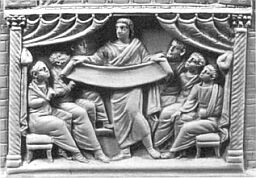
Marcion of Sinope teaching
(source: wikipedia)
Karl Barth on Marcion: A Reappriasal
The obvious intention of Marcion is to look wholly and exclusively to the covenant. If only he had seen the real covenant! But the fact that his abstraction has this in view is what seems to render his doctrine so plausibly Christian. God is for him wholly and utterly the love manifest in Christ. There are few Christian theologians who refer faith so strictly to God's revealing work in Christ, who so earnestly try to connect it with Christ alone, as this heretic did. That is why Harnack thought he could speak, in obvious commendation, of Marcion's Pan-Christism. But all that glitters is not gold. Marcion's Christology is in fact docetic. He maintains that the unknown God did not become man in Christ, but only the likeness of this unknown God becomes at this point only an empty conceptual assertion not corresponding to any observation. And this means above all that there cannot be a Gospel of this unknown God because even in Christ He has confronted man in alien form, and remained alien, not entering into solidarity with him.
The whole gracious and merciful love for which Marcion praises Him was no so great that it could even be truly revealed to man, let alone save him. This Christ—and here too Marcion could only assert the contrary—could not speak, act, suffer, die and rise again. Deprived of their natural connexion with a real man, these statements are all irrelevant. If they do not say that a man did all these things, they say nothing at all. And it depends on just these statements whether we can believe that it was the true Son of the true God who freed man and brought him eternal life. The God who remains aloof—although He is the epitome of love, but only its epitome—can only exclude and not include man and the creature.
The creature cannot in truth believe in Him. If He is incapable of Himself becoming man, He is also incapable of entering into real fellowship with man, of being the resurrection and life of man. This is implied by the statement which Harnack is so fond of quoting and which is supposed to have formed the beginning of Marcion's Antithesis: "O wonder of wonders, rapture, might and astonishment, that man can neither say nor think anything concerning the Gospel, nor compare it with anything!" Marcion's whole message of joy and emancipation has a hollow ring against this background. There is no doubt that Marcion's gaze is directed towards the covenant. And his aim is to look in this direction with the eyes of the one apostle Paul and in accordance with a New Testament purified from all Jewish accretions and misunderstandings. But his view is too radical, and in the last analysis too secular, for him to be able to see what is really to be seen here. He purifies the New Testament so drastically that he cannot appreciate its true Christ, and His existence even in Israel, and the connexion of the whole of the New Testament with the whole of the Old. He apprehends the witness of Paul the Jew only in violently distorted form. In his view, therefore, the covenant becomes a fruitless antithesis between the fixed idea of pure Godhead and a humanity a priori excluded from it because in view of its sheer novelty and transdencence [sic] the former cannot concern it, much less enter into a covenant with it in accordance with the assertion that it is love.
In Marcion's view the covenant is not really a covenant at all. The result is obvious. Because he refuses to see the true God revealed in Christ. Hence he cannot understand this true God as the Creator. And in the Creator he can see only another and inferior God who is only just and not loving. Hence in creation (since this God is its author) he can see only an evil deed which cannot possibly be described as beneficent and the reversal of which is the only concrete form of the hope of redemption. Where the humanity of Christ is also proclaimed. Hand in hand with his denial of Christ's humanity, Marcion laid the greatest possible emphasis on His divinity, and with a supreme logical consistency hardly stained by any other Docetic he grasped and stated the consequent position of Israel and the Old Testament, the Creator and creation.
The aim and fulfillment of the real covenant is Christ as very God and very man in one person. Thus the real covenant does not exclude but includes Israel and the Old Testament, the Creator and creation. If we see the real covenant, things which for Marcion are outside Christ and in darkness are set in the light of Christ. The merit of Marcion is not to have evaded the consequences of negating this connexion, and therefore to have exposed the true basis of every denial of the statement that creation is benefit—a basis which is no less effective and menacing even in less consistent negations of the connexion.
Barth, Karl. "Church Dogmatics Study Edition 21" Ed. T. F. Torrance and G.W. Bromiley. III.1 The Doctrine of Creation. Trans. G. W. Bromiley. London: T & T Clark, 2010. 332-3. Print. [337-8]
Related: Adolf Von Harnack, Arch-Heretic, CD III/1, Church Dogmatics, Church Dogmatics III/1, Karl Barth, Marcion of Sinope, Marcionism, Marcionite, Pan-Christism



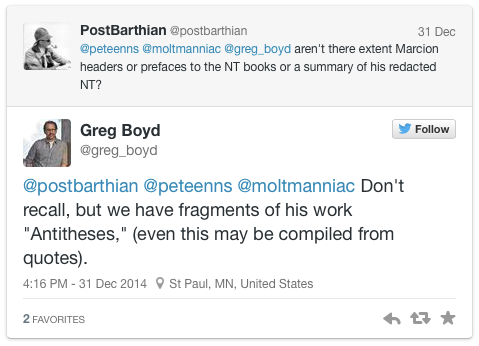
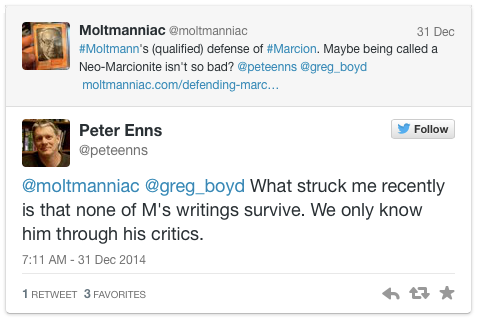
September 17th, 2015 - 17:24
I would think by now, we would not think of Marcion as a heretic. It is a convenient and artificial label. Clearly, the forged false Pauline writings of I Timothy and II Timothy were written by the Catholic branch of Churchman who wanted to stifle the teaching coming from the Churches in Asia (of whom St. Paul was responsible and did write to).
Far more “Gnostic Christian” than Marcion were some of St. Paul’s own followers. Both Origen and Clement of Alexandria testify independently stating that the only known verifiable succession of Paul was that of Theudas (a follower and student of Paul) who then taught Valentinus, who taught Ptolemy, who in turn taught Heracleon. Interestingly, Heracleon complained in his own day that his group were the only ones remaining to still teach Paul. And, they did. Where are the followers of Titus and Timothy? Was not Timothy charged to set Bishops and Elders in the Church, men of authority and sound doctrine? So, where are their writings of sound doctrine and expositions of what St. Paul taught? Centuries later when Martin Luther began to teach the most basic of Paul’s teaching… Luther was labeled a heretic. Hmm.
April 16th, 2023 - 12:11
Can you tell me who wrote this? I need the author’s name for reference to a treatise I am writing, so I can quote him:
Thank you.
“In his letter, Polycarp also refers to a certain Valens. By this time, the older people were regarded as having almost apostolic authority, and Valens had used the position given him by the people in order to make money for himself. Since this accusation of greed appears twice in the earlier parts of the letter, it is quite probable that what Valens was doing was providing support for the opposing teachings. It is the view of the majority of exegetes that Marcion of Synope is the chief opponent of Polycarp in this correspondence. Yet if Marcion is in view at all in this letter, it is surprising that his followers should be labeled as greedy — for Marcion promoted extreme asceticism. Perhaps the attachment to Marcion comes from the later forgery, the “Martyrdom of Polycarp,” which expressly uses the “firstborn of the Enemy” quote to refer to Marcion. It is distinctly likely, then, that this letter does not refer to Marcion at all, nor to any of his teachings.”